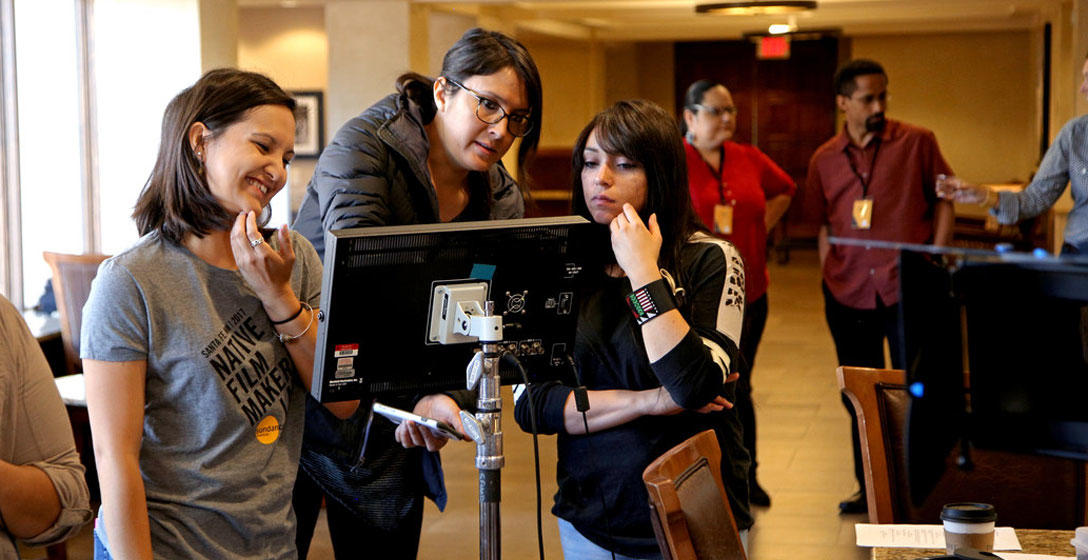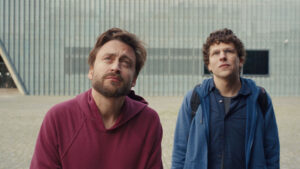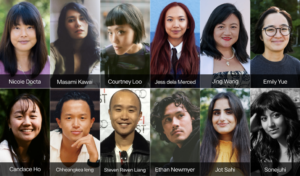(L-R) Erin Lau, Sydney Freeland, and Charine Gonzales at the 2017 Native Lab in Santa Fe, New Mexico. © 2017 Sundance Institute | Photo by Babak Dowlatshahi
Erin Lau
Erin Lau is a Native Hawaiian filmmaker and 2017 Sundance Institute Native Lab Fellow. She has written and directed multiple award-winning shorts that have screened at festivals around the world. Below she writes about her experience as a fellow and the importance of elevating Native voices.
Wrapped in blankets, I would wander into our yard as a child and peek out at Mokoliʻi, a tiny cone-shaped island off Oahu. Storybooks said it was the hat of an enormous Chinese man who slept under the sea, but my grandmother told me it was the tail of a massive lizard whose large, jagged back made up the mountains along our house.
Under those same waters lived a giant shark, who was believed to be one of our ancestors. That shark would chase fish toward the shore and into the nets of my great, great grandfather. At night, I listened to family and friends sing Hawaiian melodies about that great shark, our ancestors, and many other stories passed down for generations. Those experiences shaped the person I am and influenced my voice as a filmmaker.
Being raised by passionate storytellers and recognizing the lack of representation from the Pacific Islander community in entertainment fueled me to share the stories of my home, Hawai’i. Films have the ability to empower people, create empathy, and build bridges between communities. They remind us that we are not alone in our struggles or our values. They remind us that we matter.
Our narratives have been mostly warped portrayals, crafted and shared by outsiders. Yet in order for work to be truly empowering and emotionally effective, it has to be authentic and honest. That is part of the reason why it is so important for Native stories to be told by Native voices. How we tell stories is unique; who we are bleeds into our creative work. Our communities have talented and passionate Native filmmakers who are ready to tell our stories themselves; all they need are the resources.
The Native and Indigenous Program is working to empower and enable Indigenous storytellers to take back ownership of their stories through nurturing them to become more skilled and confident artists. In 2017, I applied and was accepted for the Native Filmmakers Lab with my project Ka Mahina a me Ka Po (The Moon and the Night). Over the course of the fellowship, I had access to industry professionals, one-on-one mentoring, and the opportunity to explore and develop my voice further as a filmmaker. The fellowship also awarded a grant which helped with production costs for my short film.
During the workshops, my instructors encouraged me to be true to myself, to take risks and to find strength in my culture, while never forgetting the community I represent. On the first day of shooting, I was encouraged to start my first day with prayer. I still remember the way the hair stood up on my arms as my friend chanted in ʻōlelo Hawaiʻi towards the rising sun, thanking and asking for guidance from our ancestors. Through my mentors’ guidance and the resources of the fellowship, I feel a greater sense of hope. The film I made through the lab is the highest quality film and most personal project I have ever made.
One of the most important things I gained from the lab was the chance to be surrounded and supported by other Indigenous artists. It made me realize that we are truly stronger together. We are each other’s best ally in fighting for more Native voices in cinema. The Native Program is helping bring communities together and nurturing the next generation of Native filmmakers. The more voices we have sharing our stories, the more we can empower our people.




